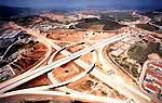|
Since around 1972, the scale of the Olympic Games has grown
to such a height that cities must risk a huge investment
when choosing to host an Olympics. With the emphasis often
to build brand-new facilities to hold events and to construct "Olympic
Villages" which house participating athletes, the Games undoubtedly
has a significant lasting effect upon an Olympic City.
Urban Renewal
With inner-city urban decline becoming a common problem
in major cities across the world, authorities are looking
for opportunities to launch schemes to rejuvenate such areas.
The hosting of a major event such as the Olympic Games is
the perfect opportunity. As a city improves its facilities
to be able to cope with the influx of visitors during the
Games, it is also leaving a lasting enhancement to its infrastructure
that will be of benefit to the local residents for years
to come.
 In
preparation for the 1992 Olympics, Barcelona was reportedly
able to achieve 50 years of infrastructure improvements in
just 8 years in areas such as the airport and road, sewage,
and telecommunications systems. The city also managed to
turn run-down locations such as the harbour area into modern,
luxurious, commercial zones which befitted the city's rich
history and architecture. In
preparation for the 1992 Olympics, Barcelona was reportedly
able to achieve 50 years of infrastructure improvements in
just 8 years in areas such as the airport and road, sewage,
and telecommunications systems. The city also managed to
turn run-down locations such as the harbour area into modern,
luxurious, commercial zones which befitted the city's rich
history and architecture.
Olympic Venues
At the heart of every Olympics Games, the location for ceremonies
and the Olympic Flame is the athletics stadium. A city must
be very careful when building any new stadia, as there is
a great risk of them becoming "white-elephants" after the
Games, and drain the city's treasury for each day they stand
unused.
 Successful stadia such as those in Sydney, Rome and Munich
have achieved their continuing success by being guaranteed
the hosting of future events. They are all used regularly
to host domestic sports events, and have each hosted a world
cup final in a particular sport.
Successful stadia such as those in Sydney, Rome and Munich
have achieved their continuing success by being guaranteed
the hosting of future events. They are all used regularly
to host domestic sports events, and have each hosted a world
cup final in a particular sport.
Local Opinion
Amongst all the benefits that the Olympic Games provide
a city, very rarely are the locals' real needs taken into
consideration. The emphasis, enforced by powerful international
sponsors, is often to focus the Games and all its facilities
into a small area for the financial benefit of these companies.
However, creating a huge number of short-term jobs, and expensive
facilities is clearly not going to be much use to local residents
in the long term.
Instead it is suggested that facilities and venues should
be spread across a larger area so that they are more use
to more people. Rather than creating new facilities, it is
also considered more prudent to upgrade existing ones - an
approach which is a much more efficient for the locals' needs.
|


